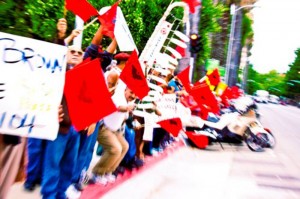
Reactions to the Veto SB 104 from Sacramento
We’ve been in a struggle that has tested every inch of my abilities and patience. My bones ached and the world was irrelevant. If an atomic bomb blasted half of the world into oblivion, even to that I would have been oblivious.
Twelve days of struggle in Sacramento from June 16-27th concluded with a passionate epilogue on the 28th to urge California Governor Jerry Brown (D) to pass SB 104, a law that would make it easier for farm workers to unionize. To our disappointment, SB 104 resulted in a veto.
In those 13 days I had the spirit of a farm worker. Farm workers knew they had to fight for this bill. Even those who were already unionized fought because they know that if farm workers don’t fight for farm workers, no one else will. So with news of the veto, a sense of disappointment, anger, and frustration was felt as fatigue crept in.
We spent the night in Sacramento in hotel rooms paid for by the United Auto Workers. I looked out my window and even though I had this great fatigue hovering over me, under me, within me, feeding off my energy like a leech, I wasn’t sleepy. I pulled out my computer and uploaded photos I had taken throughout the day. I took out my notebook and wrote down my reactions to the pictures—reactions to the faces, expressions, workers… the feelings of sadness, anger and betrayal.
Politics will be politics but politics be damned if it ever understood farm workers. A farm worker can understand politics but politics seems to have a hard time understanding them and the power that they wield.
Farm workers, I found out, place a very different value on politics. They weren’t angry so much about the fact that the Governor vetoed the bill as much as they were angry at the form that he vetoed it. From the three choices that he had: sign the bill into law, veto the bill and don’t let it become law, or not sign at all and let it become law after 12 days of sitting on his desk, he decided to veto the law with one hour left for it to become law on its own without his signature.
In talking to the farm workers many wondered why he waited until the last minute, why he made them wonder every day if he knew he was going to veto SB 104.
And there was something else they couldn’t understand. We were outside the Governor’s office and he wouldn’t come out to talk to us. He spoke with UFW President Arturo Rodriguez over the phone but he refused to show his face.
“We farm workers were a primordial part to his campaign,” said farm worker Juan Flores in an interview minutes after the veto was announced. “The millions that his opponent spent [on her campaign] are nothing compared to the power that the farm workers had to donate their time because a lot of them donated their time without receiving a dime.”
Governor Brown called farm workers to endorse his campaign during which he said something along the lines that growers brought in farm workers, squeezed them of their labor and tossed them aside when they were done with them as if they were a squeezed orange.
So we got boxes of oranges that had already been squeezed and one by one farm workers and supporters placed those oranges into boxes with a picture of Governor Brown walking alongside César Chavez and placed those oranges in the Governor’s office. That’s how they felt. Used like a tossed orange.
What can I take from this weary sense of justice? What can I learn from farm workers? They speak of dignity, they speak of justice, they speak of a forgotten hope toppled and maimed under a larger word called “budget.”
But a fight is a fight and we never took a kick lying down. Betrayed but not defeated, dignity and justice mixed into a strange primordial liquid that has given us strength to keep on moving towards the cliché known as “hope.” Hope is a sensation that we know well in movements that devour sanity and logic to leave only that—Hope. Hope is what we live for and what we live off of.
There is hunger in the fields yet hope comes through us and is manifested in a fist raised in the air and a chant that says, “¡Si Se Puede!” Hope is harvested, cared for, it is fragile. It can be drowned by overwatering or shriveled by neglect; it can wind through the paths of uncertainty.
Hope can be grown from the ground and it can be picked and bottled into wine and diluted. Or it can be eaten raw, it can be bitter, it can be sweet, it can be many things but hope is hope and we need it to live, we need it to fight and we need it to continue the struggle towards Justice.
As we left Sacramento on that last day I asked many farm workers if they thought that this was the end of the struggle. All of them said the same thing—this is just the beginning.
“Joaquín Magón” is a youth reporter from Coachella living in Salinas and working for the United Farm Workers. He will contribute blogs regularly for Coachella Unincorporated.


